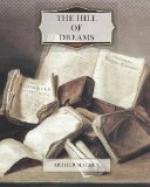He had seen the life which he expressed by these symbols offered to him, and he had refused it; and he was alone in the grey street, with its lamps just twinkling through the dreary twilight, the blast of a ribald chorus sounding from the main road, a doggerel hymn whining from some parlor, to the accompaniment of the harmonium. He wondered why he had turned away from that woman who knew all secrets, in whose eyes were all the mysteries. He opened the desk of his bureau, and was confronted by the heap and litter of papers, lying in confusion as he had left them. He knew that there was the motive of his refusal; he had been unwilling to abandon all hope of the work. The glory and the torment of his ambition glowed upon him as he looked at the manuscript; it seemed so pitiful that such a single desire should be thwarted. He was aware that if he chose to sit down now before the desk he could, in a manner, write easily enough—he could produce a tale which would be formally well constructed and certain of favorable reception. And it would not be the utterly commonplace, entirely hopeless favorite of the circulating library; it would stand in those ranks where the real thing is skillfully counterfeited, amongst the books which give the reader his orgy of emotions, and yet contrive to be superior, and “art,” in his opinion. Lucian had often observed this species of triumph, and had noted the acclamation that never failed the clever sham. Romola, for example, had made the great host of the serious, the portentous, shout for joy, while the real book, The Cloister and the Hearth, was a comparative failure.
He knew that he could write a Romola; but he thought the art of counterfeiting half-crowns less detestable than this shabby trick of imitating literature. He had refused definitely to enter the atelier of the gentleman who pleased his clients by ingeniously simulating the grain of walnut; and though he had seen the old oaken ambry kicked out contemptuously into the farmyard, serving perhaps the necessities of hens or pigs, he would not apprentice himself to the masters of veneer. He paced up and down the room, glancing now and again at his papers, and wondering if there were not hope for him. A great thing he could never do, but he had longed to do a true thing, to imagine sincere and genuine pages.
He was stirred again to this fury for the work by the event of the evening before, by all that had passed through his mind since the melancholy dawn. The lurid picture of that fiery street, the flaming shops and flaming glances, all its wonders and horrors, lit by the naphtha flares and by the burning souls, had possessed him; and the noises, the shriek and the whisper, the jangling rattle of the piano-organ, the long-continued scream of the butcher as he dabbled in the blood, the lewd litany of the singers, these seemed to be resolved into an infernal overture, loud with the expectation of lust and death. And how




